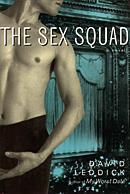
Gay/Lesbian/Feminist Bookstores Around the Country
The Mostly Unfabulous Homepage of Ethan Green
![]()


The Sex Squad
From "How I Became a Dancer"
We came to New York, my mother and I, when I was seventeen. Just seventeen.
To pursue our careers in dance. My mother was the one who wanted to be
a dancer. I was just along for the ride.
My mother's name was -- is -- Elizabeth. Everyone back in Michigan called her Betty. Once we left Michigan, she decided she wanted to be called Belle-Mere. She pronounced it Belle-Meer. To rhyme with "peer" and "sheer" and "leer." And "queer." Only when I was studying French in college later did I learn it meant "mother-in-law." When I told her she said, "Who knows? Who cares? That's the least of the things we did wrong." We? I still don't know for sure how much she knows. I'm not going to ask her, that's for sure.
My mother was a Red Shoes victim. She did have long legs and red hair, I'll give her that, but Moira Shearer she wasn't. Unfortunately, she was thirty-six years old when she saw The Red Shoes , so she couldn't even do a Zelda Fitzgerald. But, by God, she tried.
We were from Whitehall, Michigan. The Potters arrived in Whitehall on the Lake Michigan shore at the time of the Civil War. That was my father's family. My mother was a Glover. I guess the Glovers arrived about the same time, when it was just woods and Indians. When Elizabeth Glover married Harry Potter, it was just what the folks in Whitehall had expected.
They evidently didn't expect Harry to run off with Miss Whitehall when I was ten. She was one of the DeBeers girls. As my grandmother Glover used to say, not unkindly but factually, "She was one of those girls from down by the lake." We lived on a bluff called Christian Hill. I think you get the idea.
I didn't see much of my father after he left town. I didn't see much of him before. Like most fathers, he found having a family crushingly dull. My memories of him, when he was home, consist largely of him lying on the couch listening to baseball games and smoking. That he found interesting. I played baseball quite well in high school -- I'm well coordinated -- but I never found it interesting. I'm just not a spectator kind of guy. Even when I was a dancer, I enjoyed doing it but I never particularly liked to watch other people do it.
I'm certain no one in Whitehall expected my mother to become a ballet fanatic. But she did. She dragged me to Detroit to see Roland Petit and Zizi Jeanmaire dance Carmen. I must have been twelve by then. It was pretty hot stuff for a preteen. I'd never seen anyone slide up and down someone else's thighs in their underwear before. I haven't often since. Well, that's not true. Anyway, my mother didn't seem to think it was too shocking for her child to see. She loved it.
We followed that up by going to Chicago to see the New York City Ballet. Melissa Hayden in The Cage. More sliding up and down other people's thighs. I think Belle-Mere might have started to get discouraged at this point except that Maria Tallchief danced a one-act Swan Lake the same evening. And that got Mother all worked up again.
After that, we went back to Whitehall and she began reading. I remember an avalanche of books pouring across the dining room table. While I was studying Algebra for Beginners, she was reading Beaumont's Book of Ballets. While my eyes were popping open over the big news about the Jukes and the Kallikaks in Biology 1, she was having to force her lids down a little, too, as she discovered what really went on between Nijinsky and Diaghilev. At least as Romola Nijinsky told it.
Ballet bibliography must have been hard to find in the backwoods of Michigan in the early 1950s, but Belle-Mere managed it. I distinctly remember she was infatuated with Mathilde Kchessinska, an imperial ballerina. I asked her what it meant to be "the bauble of the Czar," but she wasn't answering. I knew damn well what it meant, I just wanted to bug her. Secretly, I'm sure she was crushed that there weren't any more czars and that there was no hope of her becoming a bauble.
During that winter, she began to transform her plans for a dancing career for herself to include me. I guess it became increasingly clear to her that to become a classical ballet dancer, one had to start young.
I knew something was in the wind when I came home after a freshman basketball game with Rothbury (we lost twenty-seven to eight.) She had been to the game and seen me in my baggy shorts. She said, "You've got nice legs, Harry." I'm Harry Junior. "You've got my side of the family's legs. We all have nice legs. Your grandmother still has nice legs, and she's in her sixties."
I had never thought about having nice legs before. Not many boys in Whitehall High had, I would guess. I ventured, "Yeah, but I've got big feet."
"You're still young," she said. "You'll grow up to your feet and out of your pimples."
Her next step was the purchase of a "Do It Yourself" book on ballet. It was by Zachary Solov, whom we were to know much better later. Then we couldn't have dreamed that someday we would know him. Zachary's book involved complicated photographs of a slightly overweight young woman in zebra-striped all-over tights. They were kind of stream-of-movement pictures so you could see exactly what she was doing in plie, rond de jambe, frappe, developpe, the works. And there was a record that went with it. If you were willing to apply yourself, you could figure out precisely what movements went with what music and you could do a barre. Which we did.
I was a strange kid. I was playing football, basketball, and baseball. Football not well -- I was too slender and couldn't really run fast -- but the other sports not badly. I had promise. I also loved to dance and went to the high-school dances and danced with every girl there. Plain ones, fat ones, pretty ones, popular ones. I was really too young to be dating, but all the girls liked to dance with me because I could dance well. We did something called the Finale then. A kind of jitterbugging. And the two-step. I could waltz and polka, too. Where I learned those, I can't imagine. I must have seen them done somewhere. Not on television, of course; this was pre-television for most of the families in Whitehall. Some people had them, but not necessarily the wealthiest. Most people regarded television as they did Coca-Cola, Hershey bars, and Cadillacs. They existed but were unnecessary luxuries.
Belle-Mere was a chaperone at one of the high-school dances, and once she saw that I liked to dance, the jig was up. I had to join her once a day clinging to the back of a chair going through the Zachary Solov exercises. I studied the book, too. I guess I must have thought of it as another kind of sport. Certainly the fat girl in the striped bodysuit didn't lead to any thoughts of airy-fairy carryings-on.
And I loved my mother.
We rather dismissed my father's departure, but Belle-Mere now had to work
down at the florist shop. I worked after school and on weekends as a stock
boy and checkout clerk at the Kroger. We didn't have any money, which
didn't really matter, because Whitehall was one of the provincial towns
where your family meant more than anything else. But even so. Balletomania
was my mother's emotional support, and I wasn't going to be disloyal to
her. So I studied our sappy little exercises with her, so she could transform
me into another Robert Helpmann. Can you imagine any mother wanting to
help her son become like the dainty and overly made-up Robert Helpmann?
But she did. What did we know? I think even then I knew more than she
did.
Sounds good? Now read some excerpts:
- The Sex Squad: The sexy, tempestuous life of a young ballet dancer.
- "Sixteenth Street": Harry's disgusting first apartment in New York, and the whole disgusting neighborhood.
- "In the Dressing Room": Enter the world of high art and low advances.
- "Neighbors": Harry learns about life at exotic parties.
Copyright © 1998 David Leddick.
 Back
to the Stonewall Inn
Back
to the Stonewall Inn 